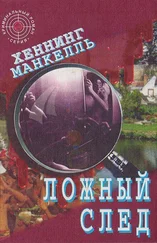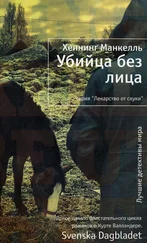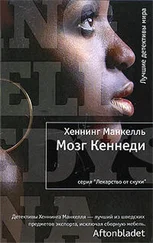Late one evening two years previously, an official at the railway station in Skövde had been about to close down for the night when he found her sitting on a bench. He told her to leave, but she didn’t seem to understand. All she could do was hold up a piece of paper on which it said ‘Train to Karlsborg’, and he began to wonder which of the pair of them was going mad, as there hadn’t been a train from Skövde to Karlsborg for the last fifteen years.
A few days later she started appearing on newspaper placards as ‘The Railway Child in Skövde’. Nobody seemed to recognise her, although there were pictures of her wherever you looked. She didn’t have a name, psychologists examined her, interpreters who spoke every language under the sun tried to get her to say something, but nobody had any idea where she came from. The only clue to her past was the mysterious slip of paper with the words ‘Train to Karlsborg’. They turned the little town of Karlsborg on the shores of Lake Vättern inside out, but nobody recognised her and nobody could understand why she had been waiting for a train that stopped running fifteen years ago. An evening newspaper had conducted a poll of its readers and given her the name Aida. She was given Swedish citizenship and a personal identity number after doctors agreed that she must be about twelve years old, thirteen at most. Because of her thick, black hair and olive-coloured skin, it was assumed that she came from somewhere in the Middle East.
Aida didn’t speak a word for two years. Only when every other possibility had been exhausted and Agnes Klarström took her in was any progress made. One morning Aida came to the breakfast table and sat down. Agnes had been talking to her ever since she’d arrived, trying to stir up some reaction in Aida, and now she asked in a friendly tone what she would like.
‘Porridge,’ she said in almost perfect Swedish.
After that, she started talking. The psychologists who came flocking round assumed that she had picked up the language by listening to everything said by all those trying to make her speak. A significant fact supporting this theory was that Aida knew and understood a large number of psychological and medical terms that would otherwise hardly be normal vocabulary for a girl of her age.
She talked, but she had nothing at all to say about who she was, or what she was supposed to do in Karlsborg. Whenever anybody asked her what her name was, she replied as one might have expected:
‘I’m called Aida.’
She appeared on all the newspaper placards again. There were voices muttering in dark corners, suggesting that she had fooled everybody and that her silence had been a smokescreen to overcome all resistance and guarantee her full citizenship in Sweden. But Agnes thought there was a different explanation. The very first time they had met, Aida had stared at her amputated arm. It was as if the sight of it rang a bell with her, as if she had been swimming in deep water for years, but had now finally reached the shallows where she could stand up. Perhaps Agnes’s stump signified something Aida recognised and made her feel secure. Perhaps she had seen people having limbs chopped off. Those doing the chopping were her enemies, and those on the receiving end were the only people she could trust.
Aida’s silence was due to her having seen things that no human being, least of all a young child, should ever be exposed to, and consequently she never said anything about her past life. It was as if she was slowly liberating herself from the remains of horrific experiences, and might now be in a position slowly to start on a journey towards a life worth living.
And so Agnes Klarström now ran her little foster home caring for these three girls, with financial support from various local councils. Lots of people were begging her to open her doors to more girls skulking around in the outer reaches of society. But she refused: in order to provide the help and feeling of security necessary to make a real impact, she needed to keep her activities on a small scale. The girls in her care often ran away, but they nearly always came back again. They stayed with her for a long time, and when they finally left her for good, they always had a new life in store for them. She never took in more than three girls at a time.
‘I could have a thousand girls if I wanted,’ she said. ‘A thousand abandoned, wild girls who hate being alone and the feeling of not being welcome wherever they go. My girls realise that without money all you receive is contempt. So they disfigure themselves, they stab people they’ve never met before — but deep down they are screaming in pain from a wound they don’t understand.’
‘How come you got involved in all this?’
She pointed at the arm I had amputated.
‘I used to be a swimmer, as you might recall. There must have been something about that in my records. I wasn’t just a hopeful, I really could have become a champion. Won medals. I can say, without bitterness, that my strong point was not my legs, but the strength I had in my arms.’
A young man with a ponytail marched into the room.
‘I’ve told you before that you must knock first,’ she shouted. ‘Out you go! Try again!’
The young man gave a start, went out, knocked and came in.
‘Half right. You must wait until I tell you to come in. What do you want?’
‘Aida’s upset. She’s threatening everybody. Mainly me. She says she’s going to strangle Sima.’
‘What’s happened?’
‘I don’t know. Maybe she’s just miserable.’
‘She’ll have to learn to cope with that. Leave her alone.’
‘She wants to speak to you.’
‘Tell her I’m coming.’
‘She wants you to come now.’
‘I’ll be there in a minute.’
The young man left the room.
‘He’s not up to it,’ she said with a smile. ‘I think he needs somebody snapping at his heels all the time. But he doesn’t mind my criticising him. After all, I can always blame everything on my arm. He’s come to me thanks to some unemployment benefit scheme or other. His dream is to be in one of those television reality programmes where the participants get to screw each other in front of the cameras. If he can’t manage that, then he hopes to become a presenter. But simply helping my girls seems to be beyond him. I don’t think Mats Karlsson is going to make much of a career for himself in the media.’
‘You sound cynical.’
‘Not at all. I love my girls, I even love Mats Karlsson. But I’m not doing him a favour by encouraging his flawed dreams, or letting him think that he’s making a positive contribution here. I’m giving him an opportunity to see himself for what he is, and perhaps carve out a meaningful life. Maybe I’m wrong in underestimating him. One day he might have his long hair cut off, and try to make something of his life.’
She stood up, escorted me out into a lounge and said she would be back shortly. The rock music coming from somewhere upstairs was still excessively loud.
Melted snow was dripping from the roof outside the windows, songbirds were flitting around like hastily formed shadows.
I gave a start. Sima had entered the room behind my back, without a sound. This time she wasn’t holding a sword. She sat down on a sofa and tucked her legs underneath herself. But she was on guard the whole time.
‘Why were you watching me through your binoculars?’
‘You weren’t the one I was looking at.’
‘But I saw you. Paedophile!’
‘What do you mean by that?’
‘I know your type! I know what you’re like.’
‘I came here to meet Agnes.’
‘Why?’
‘That’s something between us.’
‘You fancy her, do you?’
I was shocked, and blushed.
Читать дальше












